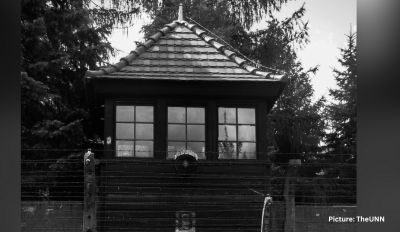Father looks at the Christmas bulbs in a market in Shimla’s centre, the Ridge. There is Christ Church and there is the plaza with people around and then there are the stalls selling everything from chaat papdi to pudees, Christmas angels to Santa masks. He is at one of these stalls, comparing the sheen of the green one to the sharpness of the red one, and he starts to think about his mother. In the snowy hills of Himachal Pradesh, the Christian community is rare, scattered in the various other homes and communities belonging to Hindus. Still, inside of Father’s family home just outside of Solan, the word of Christ held power, and the celebrations were like any other Christian celebrations in any other part of the world. His mother used to buy ornaments like these to decorate their cottage. She would buy silver and porcelain angels, golden balls that lit up the room, and glass balls coloured in dark velvet, navy green, and icy blue. The Christmas feast was enormous, from chicken biryani to roasted mutton, and kheer made out of the freshest milk for dessert. Over the past few decades, Father celebrated Christmas in the home he shared with his wife in Shimla, but it was almost impossible for him to dissociate his mind from those blissful, peaceful memories of pine trees upon pine trees scattered across the settlements underneath the hill that their family home perched on.
It’s been so long since he spent a Christmas with his mother. It has probably been decades. If his brothers had permitted, his mother would have moved to his home in Shimla already, a decision the family made earlier in light of her progressing dementia. Though the delay is probably for the best since the maid needs time to clean the house, and by clean, his wife has told the maid to also remove all the dust in the rooms they do not use.
His wife is still looking at the two balls, comparing them by bringing her face close to each, back and forth. He wishes she would just pick one. She does this every year when they come to the Christmas market. She has to buy something unique and special on the claim that she wants to make this Christmas feel different from the others, but whatever she buys always resembles what they already have at home.
Father imagines what his mother would say. Her dementia has gotten so bad that if she even saw one of these balls, her eyes might light up, she might mouth the words ‘Jesus’ or ‘Christmas’ in English, and then she would look downwards, glumly, tucked in the blanket laid over her wheelchair, lost in the machinations of her mind that had come to be her normal.
Mother is reaching for a white ball with an ‘Om’ on its side. Father pushes her hand away and says, ‘We have one at home already.’
‘We do not.’
‘We have only.’
‘I do not remember.’
‘Well, I do remember. It is at home.’
‘Bhai,’ the man at the counter says. ‘Why are you interrupting madame? She knows what she wants. Let her have.’
Father does not like how this random person, probably in his forties and well fed by the looks of his belly, has interrupted him. He shouts in Hindi, ‘Bhai, you are not my bhai. She is my wife. I can talk to her as I want.’
Father doesn’t mean to raise his voice, but in doing so the man decides to raise his own twofold. ‘Bhai, you are interrupting my business. What are you doing? Let her make her decision.’
‘What are you saying? You cannot tell me how to talk to my wife, and you cannot talk to me as such.’
The two are shouting now, and other people have started to watch. Two women clad in thick winter-wear take advantage of the bickering to force themselves into Father and Mother’s space with their own opinions, resulting in Mother participating in the shouting match. The shouting attracts a random police officer who comes with his stick, pointing at everyone to behave. Intimidated by the man, Father pulls Mother away from the stand.
They are now standing on the other side of Hawa Ghar, taking in the views of the British-style colonial buildings and the piles of snow down the hillside.
‘Why are you fighting with random people?’ Mother yells.
‘I am not fighting.’
‘You are fighting only.’
‘He was wanting to fight with me.’
‘He was not fighting. He was wanting to make sales.’
‘We do not need that bulb. It is a waste of money.’
‘Everything is a waste of money. You will not have cake for Christmas. You will not order wines for the house as well. You are scared to spend anything.’
‘Of course I am,’ Father says. ‘Soon we will have one more mouth to feed. Do you not remember?’
Mother looks like she wants to bite something, but her facial expression suddenly changes. She clamps her mouth shut and inhales the winter air properly before speaking.
‘I know you are scared of disappointing her. She is your mother. She is special to you. And you want to treat her well. You do not want to fail. But we have plenty of money. And remember your mother’s state of mind: she will want to see the Christmas bulbs. This is why I wanted to buy a special one this time. It will help her enjoy the season.’
That is true, Father thinks. He remembers how much joy the thought of Christmas used to give to his mother. He thinks about the cold of the season in his village, paired with the hot kheer of his mother that warmed his body like the heating he enjoys every day in Shimla. His mother taught him the meaning of Christmas well: to remember the importance of the lessons Jesus Christ taught his community, to put emphasis on not holding grudges or remaining angry, to forgive each and every small thing.
His mother will be home with them in just some weeks. And when she comes, she will want to come to a house filled with love and steadiness, the sort of house that she had raised him in.
Father reaches for Mother’s hand. At first she is surprised; Father rarely does romantic gestures like this, especially when they are in public and in the presence of many other people. Then the tension slips from her face, and she smiles back. She takes advantage of his grasp to pull him towards another stand. This one is right under Christ Church, with dolls knitted in the shape of Santa. As his wife goes through them, he imagines how his mother would look holding one.
Most likely she would like to have one in her wheelchair, to hold, just as she would previously hold him as a little boy.








